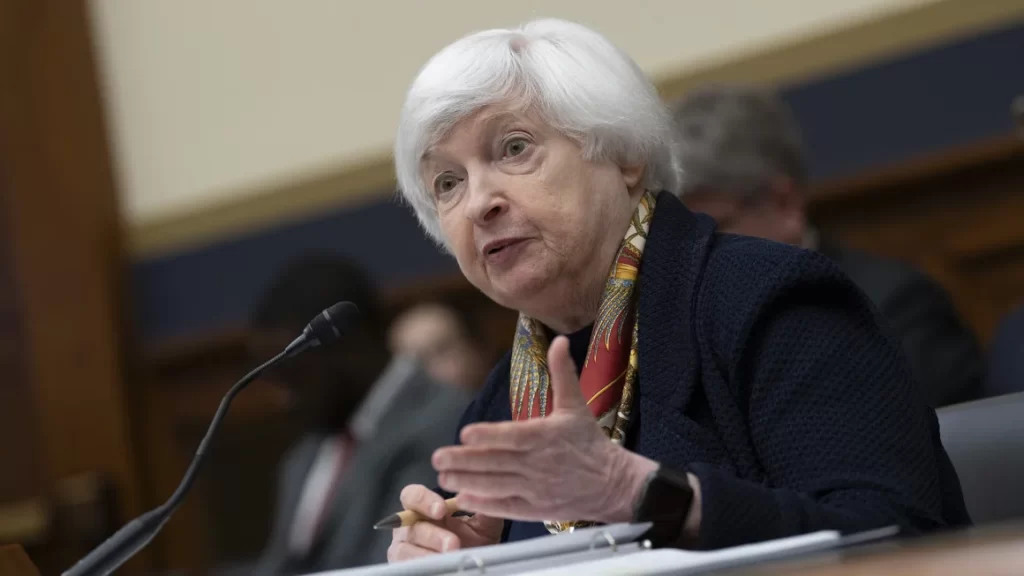Treasury Secretary Janet Yellen issued a strong warning on Thursday, labeling calls for sweeping tariffs as “deeply misguided” and cautioning that such measures would exacerbate inflation and negatively impact American businesses. This critique indirectly targeted former President Donald Trump’s economic strategy, which has emphasized high tariffs as a cornerstone of his policy agenda.
Speaking at the Council on Foreign Relations in New York City, Yellen’s remarks come at a crucial time, just weeks ahead of the election when economic concerns are at the forefront for many voters. Trump has made significant tariff proposals a key part of his platform, and Vice President Kamala Harris has labeled these plans as a “Trump tax,” warning that they would lead to increased costs for American families.
While Yellen did not mention Trump by name, her speech was a clear rejection of the “go it alone” approach and across-the-board tariffs. “Calls for walling America off with high tariffs on friends and competitors alike, or treating even our closest allies as transactional partners, are deeply misguided,” she stated. Yellen argued that broad, untargeted tariffs would lead to higher prices for families and diminish the competitiveness of U.S. businesses.
Furthermore, she emphasized the necessity of international cooperation to address pressing issues such as climate change, supply chain disruptions, and geopolitical tensions. “We cannot even hope to advance our economic and security interests — such as opposing Russia’s illegal invasion of Ukraine — if we go it alone,” Yellen said. She urged that the complexities of today’s challenges require a new approach rather than relying on outdated strategies.
In a question-and-answer session that followed her speech, Yellen defended the Biden administration’s choice not to repeal the tariffs imposed during Trump’s presidency. “The main reason for that is we look to China to address the practices highlighted in the [Section] 301 action, which were related to unfair competition, and China has not adequately responded,” she explained. She added that President Biden felt it was inappropriate to lower tariffs when China had not made meaningful attempts to rectify the unfair practices.
During his time in office, Trump enacted tariffs on approximately $300 billion worth of Chinese goods, a strategy that the Biden administration has largely maintained and in some instances expanded. Trump has asserted that if reelected, he would impose tariffs of up to 20% on all foreign imports and even higher tariffs on Chinese imports. He also proposed a “100% tariff” on countries that move away from using the U.S. dollar.
In a recent speech at the Economic Club of Chicago, Trump declared, “To me, the most beautiful word in the dictionary is tariff.” He defended his tariff plans, dismissing concerns about potential negative impacts on American consumers. “It’s for the protection that we have here and the new companies that will move in because we’re going to have thousands of companies moving into this country,” he asserted, claiming that tariffs would yield a “positive, not a negative” economic effect.
Yellen also took the opportunity to comment on Republican proposals to extend Trump-era tax cuts, indicating that such measures would be fiscally irresponsible. “I believe it’s important for our nation to have a responsible fiscal policy and to be on a sustainable fiscal path,” she said, noting that extending these tax cuts could lead to an estimated $5 trillion increase in deficits over the next decade. “Unless that’s paid for in some way, that’s something we just can’t afford,” she added.
As the election approaches, the debate over tariffs and fiscal policy is likely to intensify. Yellen’s remarks reflect a broader concern about the potential repercussions of protectionist measures on the U.S. economy, underscoring the importance of thoughtful and collaborative approaches to international trade and domestic fiscal policy.









